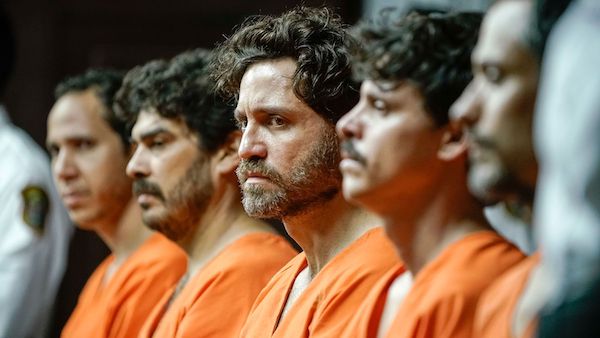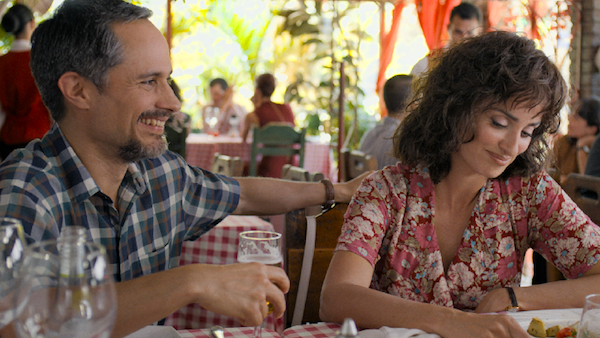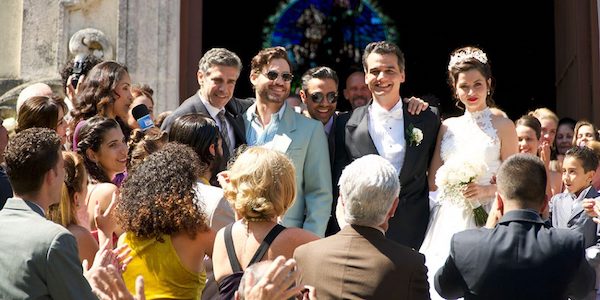Filmmaker Olivier Assayas spent six months in Cuba making Wasp Network, his version of a real-life incident involving the “Cuban Five,” agents and counteragents who were either aiding or subverting anti-Castro activists in Florida. The complicated storyline led to an equally complicated production involving two cinematographers, Yorick Le Saux and Denis Lenoir. Starring Penélope Cruz, Édgar Ramírez, Gael García Bernal, Ana de Armas, and Wagner Moura, it streams on Netflix starting June 19. He spoke in New York City during a press tour for the film.

Can you talk about how you found this story?
I had wanted for a while to make a movie with Édgar Ramirez again, to do something in the spirit or style of what we did together on Carlos. A Brazilian producer, Rodrigo Teixeira, sent me a book about the characters, and he sounded serious about it, like he wanted to make it happen.
I was interested in the people. I think spies are exciting movie characters, and I thought the story was complex and ultimately controversial. Also it gives me an opportunity to deal with individuals caught up in history.
It seems as if the characters don’t realize what’s happening to them.
They make sacrifices they hardly even understand.
You said you weren’t that interested in recreating the real-life characters.
I personally met René [René González, played by Ramirez], Olga [Olga Salanueva, played by Penelope Cruz] and Gerardo Hernández [played by Gael García Bernal]. I liked Gerardo. René González was a silent type, more like a soldier. I think I made René and his wife Olga more human than they actually are. They tried really hard to stop the film, because they thought it would be detrimental to his political career. René created a lot of problems for us.
I think Gerardo helped us, even if I have no proof of it. I think he was more supportive of it.
How long were you in Cuba?
I spent the most of 5 months in Cuba, on and off. I can’t say I got a sense of what the regime is about, but I understood what it is to live in an authoritarian country, where you have two parallel worlds co-existing. Meaning you have a tourist world where you go from to fancy restaurants, clubs, to the beach, to resorts. One that functions within an economy where you basically pay the same money for your dinner in Havana as in New York or in Paris. If you’re a tourist guide or a waiter, you make more money than if you’re a brain surgeon.
And simultaneously you have a population who lives in absolute misery. Where they’re cutting off the Internet so people don’t have access to what’s going on in the real world. You can see these two worlds right in the center of Havana, where they are simultaneously cleaning it up for the tourists, but you have people who still live in abject misery.
It’s a third world country, and it has the worst characteristics of third world countries. Meaning you have an elite that lives much better and a general population in very depressing circumstances.
Those two worlds existed before the revolution.
Before Castro you had Batista who was very friendly to the mob, willing to let the Mob own Havana and the casinos and so forth. You could see the split in an even more exaggerated way in Batista’s time. When you look at the ruins of what Havana has become, the palaces, the wealth of rum and sugar cane barons, and then how the peons who did the work lived, you can see the extremes of class.

Did you feel you were being observed while you were working in Cuba?
We were. They listened to conversations on our phones. To make movies nowadays, you need the Internet to communicate, print materials, etc. So you need Wi-Fi, but you can only find it in very specific places in Havana. To get it in our offices, we had some kind of computer technician come, and he had to install Wi-Fi apps on our phones and our computers. Obviously the authorities used them to monitor us.
We had people, including very nice people, there to watch over what we were doing. I mean I don’t know if spied upon is the right term, but it was pretty close to that.
You must have anticipated that.
As long as it didn’t affect the film, I didn’t care. I have nothing to hide. It’s not like — well, I wouldn’t send jokes, I was careful about texting friends, careful about what I was writing or not writing in emails. But ultimately I had like zilch to hide.
From the start, our rule was: this is the screenplay, this is the screenplay you’re not going to touch, you’re not going to interfere, and that’s it. The one time they tried to interfere I just got angry and they instantly retracted.
What did they get upset about?
There was a scene where one of the spies, the guy who placed the bombs, is being interrogated in prison. He’s wearing boxer shorts. The Cubans said, “Oh we would never do that, we would never interrogate a guy in his boxers.” Fuck you, you would do much worse than that. We’re showing a mild version of what you would have done.
But the Cubans were okay with you recreating bombing incidents?
Recreating the bombings was something the Cubans were completely comfortable with, because they were the victims. That’s what they wanted to show. We had zero problems. We had access everywhere. We could interview people who were there at the time, so we knew exactly how to shoot it.
I almost had an argument with my set designer [François-Renaud Labarthe] because he wanted to reconstruct the lobby of one of the hotels. I told Francois we didn’t have that kind of money. He said, “Well, they will never allow us to shoot there, and if we want to show the bombing and its results, we’ll have to build a big set.” I said, “François, we can’t spend that kind of money, and, by the way, they will let us shoot in the lobby. You will see.”
He didn’t believe me. But at the hotel, we met with the manager, explained what we wanted to do, do this explosion, show the results, smoke everywhere. He’s like, “Okay, good, why not?”
This is a totalitarian country. So if we had a green light from the state, who will stop us? Not only that, but who cares?
You stage an incredible shot where René guides terrorists across the beach to a luxury resort.
Honestly, it’s stuff I never thought they would allow us to shoot. Because people are living in such poverty in Cuba, you can have lots of extras for very little money. But I did not expect the Cubans to let us control the whole beach, for an entire day, and shoot blanks from the terrace of one of the hotels. You would never get away with anywhere else. When I was describing the shot to the Cubans and to my assistants, I thought they would just laugh in my face. “Ha, ha, could you imagine we would allow something like that?” But they were, “Yes, okay, we’ll do it.”
On the day, we gave us control of the beach. We had 200, 250 extras, we had the whole terrace of the hotel, we had guys shooting machine guns, we had tourists there, and we had real guides in the middle. It was complete chaos for a few hours, but they let us do it.
But the reality was, one day we could have everything we wanted, and then the next day everything stopped because someone in the chain of command changed his mind. You never know who it is, and you never know why.
I mean they let us shoot inside the MIGs, which is something I would never imagine they would allow us. We needed shots of the planes flying, and they let us have a third plane to cover them. We gave a camera to one of the pilots, explained the shots we needed, and this guy actually took them.
I can’t imagine this happening in any other country. First of all, I can’t imagine those planes flying at all. Those pilots are out of their minds. These planes are from the 1950s, antiques. The pilots are risking their lives every single time they take off.

Why did you use two DPs?
I had two DPs, I had two art directors, I had two ADs. People had different reasons, but ultimately the reality was no one wanted to stay five months, six months in Cuba.
At the end of shooting, I think there were only one or two or three people, including me, who had been there from the start. Yorick Le Saux was supposed to do the entire film initially, but he was working on Greta Gerwig’s film [Little Women], and that went on and on and on. He was miserable about being away from his daughter. He came to me, “Olivier, please forgive me I beg you, I can’t go to Cuba right away, I want to see my daughter.”
So we did it the way we did Carlos, Yorick does half and my dear friend Denis Lenoir, who’s an amazing cameraman, will do the other half.
You can’t tell their work apart.
It’s nuances. Denis is really matter-of-fact, he’s open to any crazy idea. He has a way of framing it and controlling it. We move fast, he’s very precise. Yorick kind of connects to what I like about chaos. He has a much looser approach, he needs to create some kind of chaos around us so he can put lightning in a bottle.
I haven’t seen Penélope Cruz connect this deeply with a character in a long time.
She’s a remarkable actress and I love her more dearly now that I’ve worked with her. She’s so involved, she’s very generous, My producer Charles Gillibert said, “You know, you’re working with an old school movie star.” Her values are in the right place. Her emotions are in the right place, her love of cinema is in the right place.
Can you talk about the structure? It’s a long time before viewers see Gerardo, and then you suddenly backtrack to four years earlier.
To me it was all about making the first act of the film believable, meaning not to give away anything. That’s what really excited me. Sometimes with this structure, viewers suddenly realize that what they’ve been seeing is not exactly what they have actually been seeing. The dramaturgy, the storytelling can be a little bit flaky because ultimately you are going nowhere.
Here I wanted the tension, but also give the audience a sense of security, that we are actually telling the story of two Cuban immigrants who were very different from each other. How will they adapt to American life? My concern was to make that work as a movie, even knowing that storyline was going nowhere because I’m going to flip the cards at a specific moment. All of a sudden people are going to realize that the reality is completely different, this was all smoke and mirrors. Those guys are not actually bystanders or defectors. They are actually spies acting in an underground, hidden war between anti-Castro groups and Cuba.
Then you realize they end up being whatever you saw them as because they are only pawns in that war. In a certain way who they are doesn’t change what was essential to me, what was ultimately the arc of the film: about a family blowing up and reuniting. If I had to somehow summarize the film and how it works emotionally for me, it’s how a family splits and gets back together.


